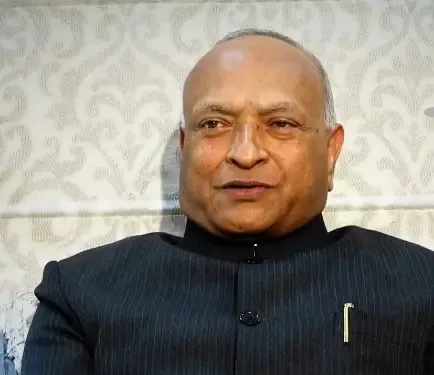How has ‘Make in India’ Transformed India’s Growth?

Synopsis
Key Takeaways
- Transformation of Defence Procurement prioritizing Indian-made products.
- Corporatisation of ordnance factories enhancing efficiency.
- Expansion into new sectors beyond defence.
- Increased FDI limits fostering foreign investments.
- Promotion of Atmanirbhar Bharat and self-reliance.
New Delhi, Sep 25 (NationPress) Former Chief Information Commissioner R.K. Mathur stated on Thursday that Prime Minister Narendra Modi’s ‘Make in India’ initiative has fundamentally altered the nation’s growth narrative by overcoming years of stagnation in both the defence and industrial sectors. It has evolved into a national mission focused on self-reliance and global competitiveness.
In a discussion as part of 'The Modi Story' series, Mathur reflected on the campaign, which was launched by PM Modi on June 14, 2014, emphasizing that it represented more than just a slogan; it was a comprehensive reform initiative.
“For many years, ordnance factories operated in an antiquated manner. Under PM Modi’s leadership, corporatisation was implemented, resulting in the conversion of 22 ordnance factories into nine public sector enterprises. Many of these are now publicly traded and performing significantly better,” he remarked.
Mathur pointed out that the most significant change occurred in the realm of defence procurement.
“There was widespread knowledge about the delays involved in this process. A new defence procurement policy was established, prioritising products manufactured in India, followed by those produced in collaboration with foreign entities. This represented a substantial shift, aligning procurement with the Make in India vision,” he explained.
He further highlighted the government's move to liberalise foreign direct investment (FDI) in the defence sector, which previously had a 26 per cent limit. “The Prime Minister raised this cap to 51 per cent, and it can now reach almost 100 per cent on a case-by-case basis. This has paved the way for advanced technology and job creation,” he added.
Over the past 11 years, Make in India has broadened its scope beyond defence, encompassing sectors such as railways, electronics, space, and renewable energy, facilitating the creation of new industrial corridors and the modernisation of essential infrastructure.
“Make in India has evolved into a movement of self-reliance, national pride, and opportunities for the youth. It has established India as a growing global power,” Mathur stated.
The initiative, rooted in the vision of Atmanirbhar Bharat, continues to be a key element of the Modi government’s economic and strategic frameworks.









